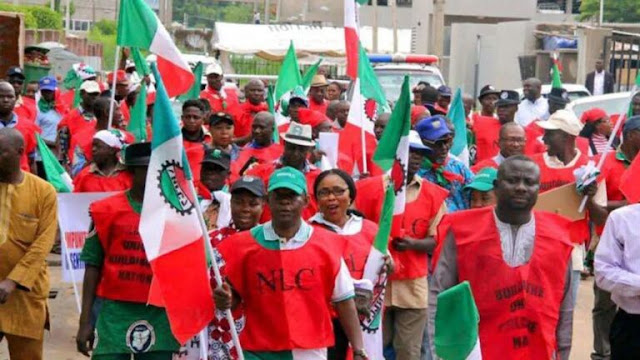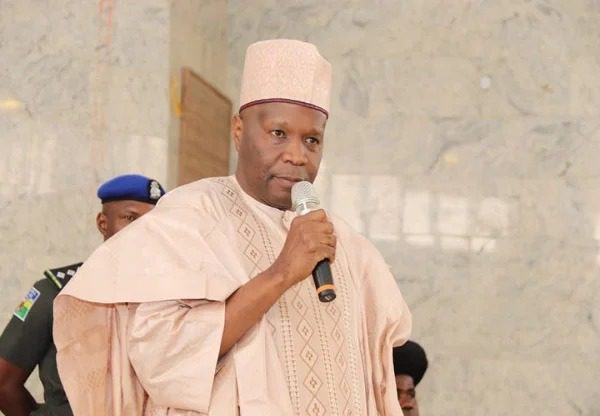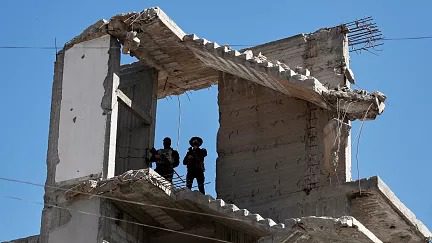Kaduna, Nigeria – August 26, 2025 – The Kaduna State chapter of the Nigeria Labour Congress (NLC) has commended Governor Uba Sani for his administration’s efforts to reinstate teachers dismissed during the tenure of his predecessor, former Governor Nasir El-Rufai. The praise, delivered by NLC State Chairman Ayuba Suleiman during an interactive session with members of the Nigerian Guild of Investigative Journalists (NGIJ), highlights a significant step toward addressing the fallout from one of the most controversial labor policies in Kaduna’s recent history. The reinstatement of thousands of dismissed teachers, coupled with the implementation of a new minimum wage and palliative measures, underscores Sani’s commitment to improving the welfare of workers and fostering inclusive governance in Kaduna State.
The NLC’s commendation comes as the NGIJ conducts a comprehensive Governance Assessment visit across Kaduna’s 23 local government areas, engaging stakeholders to evaluate the state’s progress under Sani’s leadership. The reinstatement of teachers, the introduction of a N72,000 minimum wage, and palliative measures such as free transportation for workers and students reflect a broader agenda to restore confidence in the state’s education sector and mitigate the economic challenges facing its workforce. As Kaduna navigates a complex socio-political landscape, Sani’s policies are being closely scrutinized for their impact on workers, students, and the broader populace.
Addressing a Controversial Legacy
The reinstatement of dismissed teachers represents a corrective measure to address one of the most contentious policies of the El-Rufai administration. Between 2018 and 2021, over 23,000 teachers, including head teachers, administrative staff, and science teachers, were sacked as part of a sweeping reform aimed at improving the quality of education in Kaduna State. The dismissals, which included the then-National President of the Nigerian Union of Teachers (NUT), sparked widespread criticism and protests from labor unions, educators, and civil society groups. Critics argued that the mass sackings were poorly executed, lacked transparency, and disproportionately affected qualified teachers, exacerbating the state’s education crisis.
The El-Rufai administration justified the dismissals by citing the need to remove unqualified teachers who failed a competency test, a move intended to raise educational standards. However, the policy led to significant disruptions in schools, with shortages of qualified educators and declining morale among remaining staff. The sackings also strained relations between the state government and labor unions, particularly the NLC and NUT, which organized strikes and public demonstrations to protest the decision.
Governor Uba Sani, who assumed office in May 2023, has taken a different approach, prioritizing reconciliation and restoration in the education sector. According to NLC Chairman Ayuba Suleiman, the reinstatement process has already seen significant progress, with head teachers, administrative staff, and science teachers recalled to service. Additional cases are under review, signaling a comprehensive effort to address the grievances of affected educators. Suleiman described Sani’s intervention as a “corrective step” that demonstrates the governor’s commitment to fairness and justice for workers.
“This is a government that listens to the plight of its people,” Suleiman said during the interactive session with the NGIJ. “The reinstatement of these teachers is not just about bringing them back to work; it is about restoring dignity, rebuilding trust, and ensuring that our education system has the human resources it needs to thrive.” The NLC’s praise reflects a broader sentiment among workers that Sani’s administration is taking meaningful steps to address the mistakes of the past while laying the foundation for a more inclusive future.
A New Minimum Wage and Economic Relief
In addition to the teacher reinstatements, the NLC commended Governor Sani for implementing a new minimum wage of N72,000 for workers on grade levels 1 to 7. This policy, which took effect recently, represents a significant increase from the previous minimum wage and aligns with national efforts to improve workers’ purchasing power in the face of rising inflation and economic challenges. Suleiman noted that the implementation of the new wage has already begun to impact workers positively, providing much-needed financial relief to low- and mid-level employees.
The introduction of the N72,000 minimum wage is part of a broader effort to enhance workers’ welfare in Kaduna State. However, Suleiman acknowledged that the full implementation of the wage, particularly for senior staff, requires consequential adjustments to ensure equity across all grade levels. These adjustments, he explained, will demand an additional N1.2 billion monthly in state expenditure, a significant financial commitment that underscores the government’s prioritization of workers’ welfare. Discussions between the state government and labor unions are ongoing to finalize these adjustments, with the NLC expressing optimism about reaching a mutually beneficial agreement.
The minimum wage increase comes at a critical time for Kaduna’s workforce, which has been grappling with the economic fallout of the federal government’s removal of the fuel subsidy in 2023. The subsidy removal led to a sharp rise in fuel prices, transportation costs, and the cost of living, placing significant financial pressure on workers and families. In response, Governor Sani’s administration has introduced palliative measures to cushion these impacts, including the deployment of 20 buses to provide free transportation for workers and students across the state.
Suleiman praised the free transportation initiative as a practical and impactful intervention. “The buses are not just about moving people from one place to another; they are about easing the burden on workers and students who struggle to afford transportation costs,” he said. The initiative, which covers key routes in urban and semi-urban areas, has been particularly beneficial for civil servants and students, who rely on public transportation to access workplaces and schools. By reducing transportation expenses, the program is helping to alleviate the financial strain caused by rising fuel prices, ensuring that workers and students can maintain their productivity and access to education.
The NGIJ Governance Assessment
The NLC’s commendation of Governor Sani came during an interactive session with members of the Nigerian Guild of Investigative Journalists (NGIJ), who are currently in Kaduna for a Governance Assessment visit. The NGIJ, a professional body dedicated to promoting accountability and transparency in governance, is conducting a comprehensive evaluation of Sani’s administration. The assessment involves administering questionnaires across Kaduna’s 23 local government areas, engaging stakeholders such as civil society organizations, community leaders, and government officials to gather insights into the state’s performance.
The NGIJ’s visit provides a platform for stakeholders to reflect on the achievements and challenges of Sani’s administration, which has been in office for just over two years. The reinstatement of teachers, the implementation of the new minimum wage, and the introduction of palliative measures are among the key policies being evaluated. The assessment also examines broader governance issues, including infrastructure development, healthcare delivery, and security, which have been central to Sani’s agenda.
The NLC’s interaction with the NGIJ offered an opportunity to highlight the positive impact of Sani’s labor policies while also addressing areas for improvement. Suleiman emphasized the importance of continued dialogue between the government and labor unions to ensure that workers’ rights are protected and that policies are implemented effectively. He also called for increased investment in education infrastructure, teacher training, and curriculum development to complement the reinstatement efforts and strengthen Kaduna’s education system.
Contextualizing Kaduna’s Education Crisis
The reinstatement of dismissed teachers is particularly significant in the context of Kaduna’s ongoing education challenges. The state, one of Nigeria’s most populous, has struggled with low literacy rates, inadequate school infrastructure, and a shortage of qualified teachers. The mass dismissals under the El-Rufai administration exacerbated these issues, leading to overcrowded classrooms, overstretched teachers, and declining educational outcomes. The policy also sparked a brain drain, as many qualified educators left Kaduna for opportunities elsewhere, further weakening the state’s education system.
Governor Sani’s decision to reinstate the dismissed teachers is a strategic move to address these challenges. By bringing back experienced educators, including head teachers and science specialists, the administration is working to restore stability to the education sector. The reinstatement process also sends a message of reconciliation, signaling to educators and labor unions that the government values their contributions and is committed to addressing past grievances.
However, the reinstatement process is not without challenges. The review of additional cases requires careful consideration to ensure fairness and transparency. Some stakeholders have raised concerns about the criteria for reinstatement, calling for clear guidelines to avoid perceptions of favoritism. The NLC has urged the government to expedite the review process and provide support for reinstated teachers, including training and resources to help them adapt to changes in the education system since their dismissal.
Economic and Social Impacts
The reinstatement of teachers and the introduction of the N72,000 minimum wage are expected to have significant economic and social impacts in Kaduna State. The return of thousands of educators will help address teacher shortages, improve classroom ratios, and enhance the quality of education. This, in turn, could lead to better educational outcomes, empowering the state’s youth and contributing to long-term economic development.
The minimum wage increase and palliative measures are also expected to boost workers’ purchasing power, stimulate local economies, and reduce poverty levels. By providing free transportation, the government is addressing one of the most immediate challenges facing workers and students, ensuring that they can access workplaces and schools without financial strain. These measures are particularly important in rural areas, where transportation costs can be prohibitive.
Socially, the policies are helping to rebuild trust between the government and labor unions, which had been strained by the previous administration’s actions. The NLC’s commendation of Sani reflects a growing sense of partnership, with unions viewing the governor as a leader who prioritizes workers’ welfare. This improved relationship could pave the way for further collaboration on issues such as pension reforms, healthcare benefits, and workplace safety.
Political and Governance Implications
Governor Sani’s labor-friendly policies have significant political implications, particularly as Nigeria approaches the 2027 general elections. As a member of the All Progressives Congress (APC), Sani is positioning himself as a progressive leader who prioritizes the needs of workers and citizens. The reinstatement of teachers and the implementation of the minimum wage are likely to resonate with voters, particularly in a state where education and economic challenges are top concerns.
The NGIJ’s Governance Assessment provides an opportunity for Sani’s administration to showcase its achievements while addressing areas for improvement. The assessment’s findings, expected to be published in the coming months, will offer valuable insights into the state’s progress and challenges. For Sani, the assessment represents a chance to demonstrate his commitment to transparent and accountable governance, qualities that will be critical in securing public support ahead of future elections.
Challenges and Future Directions
While the NLC’s commendation highlights significant progress, challenges remain in fully implementing Sani’s labor policies. The additional N1.2 billion monthly cost for the minimum wage adjustments poses a financial challenge for the state, which relies heavily on federal allocations. Ensuring sustainable funding for these initiatives will require careful fiscal management and potentially new revenue-generating strategies.
The reinstatement process also requires ongoing monitoring to ensure that reinstated teachers are effectively integrated into the education system. Investments in teacher training, classroom resources, and school infrastructure will be critical to maximizing the impact of the reinstatements. Additionally, the government must address the broader challenges facing the education sector, including dilapidated schools, inadequate teaching materials, and disparities in access to education between urban and rural areas.
The free transportation initiative, while impactful, will need to be expanded to cover more routes and reach a larger number of beneficiaries. Stakeholders have also called for measures to ensure the sustainability of the bus program, including maintenance and fuel costs. Addressing these challenges will require collaboration between the government, labor unions, and civil society organizations to ensure that the initiatives deliver long-term benefits.
A Step Toward Inclusive Governance
Governor Uba Sani’s policies, as praised by the NLC, reflect a broader commitment to inclusive and people-centered governance. The reinstatement of dismissed teachers, the implementation of the N72,000 minimum wage, and the introduction of palliative measures demonstrate a focus on addressing the needs of workers and citizens. These initiatives are helping to restore confidence in the government, rebuild trust with labor unions, and lay the foundation for sustainable development in Kaduna State.
As the NGIJ continues its Governance Assessment, the spotlight remains on Sani’s administration and its ability to deliver on its promises. The reinstatement of teachers is a significant step, but it is only one part of a larger effort to transform Kaduna’s education system and improve the welfare of its workforce. By continuing to prioritize transparency, accountability, and collaboration, Sani has the opportunity to cement his legacy as a leader who listens to the needs of his people and delivers meaningful change.
For now, the NLC’s commendation serves as a testament to the progress being made in Kaduna State. As the state moves forward, the focus will be on sustaining these gains, addressing remaining challenges, and building a future where every worker and student has the opportunity to thrive.






